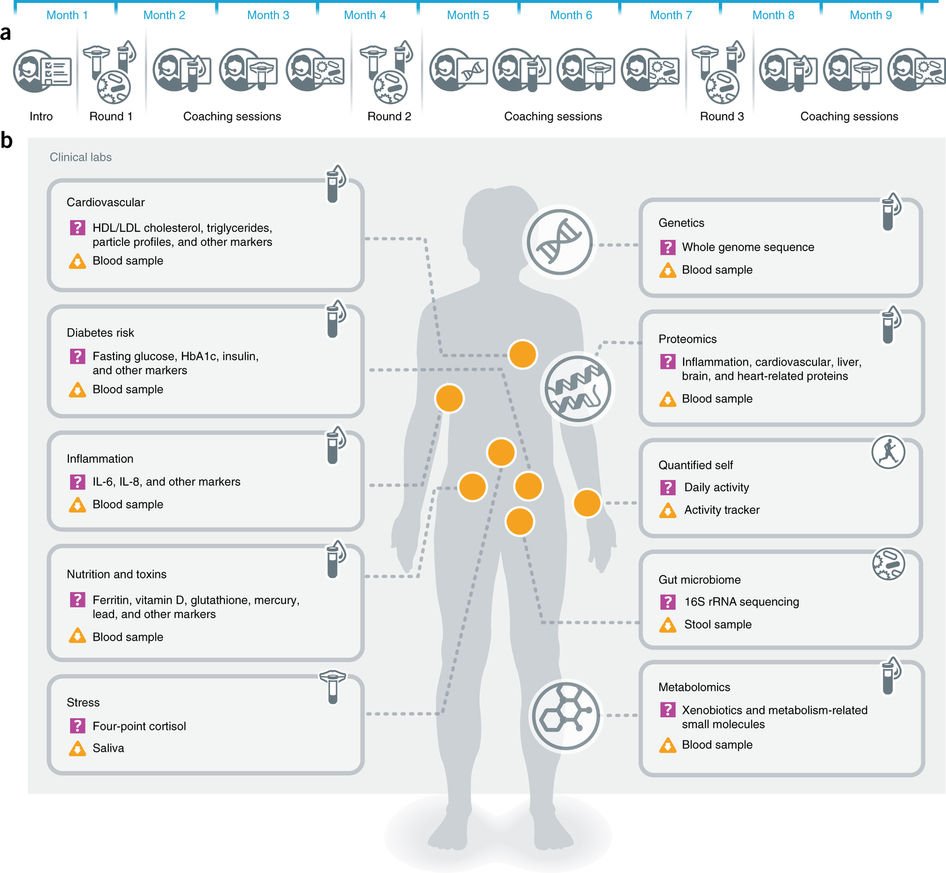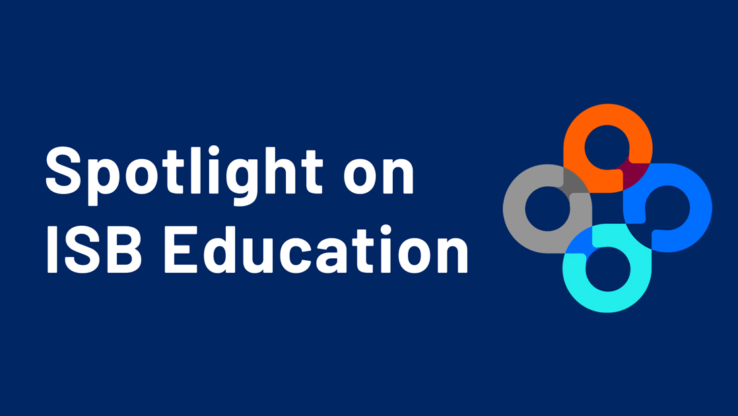Institute for Systems Biology and Arivale “Pioneer 100 Study” Establishes Foundation for New Industry of Scientific Wellness
 isbscience.org/news/2017/07/17/pioneer-100-study/
isbscience.org/news/2017/07/17/pioneer-100-study/
FOR IMMEDIATE RELEASE
Institute for Systems Biology and Arivale “Pioneer 100 Study” Establishes Foundation for New Industry of Scientific Wellness
Personal, dense, dynamic data clouds enable novel insights into mechanisms of wellness and disease, new approaches to biomarker discovery, and the empowerment of individuals to enhance their own health
SEATTLE, July 17, 2017 – The Institute for Systems Biology and Arivale, Inc. announced today results from their Pioneer 100 Wellness Project (P100), a nine-month study of 108 individuals, demonstrated that combining personal, dense, dynamic data clouds with tailored behavioral coaching can optimize wellness for individuals. These data clouds also can identify early transitions into disease states and facilitate the reversal of some disease states back to wellness. The new approach tested in this study represents the foundation for the launch of a new industry – Scientific Wellness.
“Just as the Hubble Telescope provided a new view into the universe, these data sets have been transformational in providing new insights into both human biology and disease,” said Leroy Hood, MD, PhD, president and co-founder of the Institute for Systems Biology, and senior vice president & chief science officer, Providence St. Joseph Health. “We have termed this quantitative and transformational approach Scientific Wellness, which enables individuals to improve their health and wellbeing, while generating the data necessary to optimize wellness as well as avoid or slow down the transition into certain disease states.”
The study included whole genome sequencing, the analyses of blood, urine, stool, and saliva samples collected every three months, and digital personal measurements of activity. Study investigators created personal, dense, dynamic data clouds for each participant and conducted an integrated analysis of six different types of data. The analysis included correlation of whole genome sequencing results with measurements over time of proteins, metabolites, microbiome, clinical assays and lifestyle metrics.
This study, published online in Nature Biotechnology on July 17, 2017 and in the August 2017 print issue, established thousands of statistical correlations between the data types and identified many novel data associations that provide new insights into human biology.
Multi-omic analyses build a foundation for identification of disease mechanisms, discovery of biomarkers, design of diagnostics to detect these early disease transitions, development of drug targets and ultimately, the prevention of disease. Multi-omic analysis of the participants’ data enabled the investigators to identify nearly 3,500 significant statistical correlations across data types.
Further, biomarker correlations combined with polygenic disease risks computed from Genome-wide Association Studies (GWAS) markers revealed possible ways in which genetic predisposition manifests itself through analyte changes in the blood.
Researchers combined the data-driven insights with behavioral coaching, based on actionable recommendations from genetics and clinical tests for each individual to enhance her/his health. These actions led to significant improvements in clinical markers in the P100 cohort and the subjective feeling of improved wellness for many of the participants. Behavioral coaching is a unique facet of the P100 study. The coach customized specific recommendations in consultation with the study physician and with each participant. Coaching focused on four primary quadrants: Cardiovascular, Diabetes, Inflammation, and Nutrition. The major individual recommendations fell into the categories of diet, exercise, stress management, dietary supplements, or physician referral, as relevant for each participant.
“Assessing both genetic and environmental determinants of health and their interactions takes us a significant step forward in deciphering the immense complexity of human biology and disease,” said Nathan Price, ISB associate director and professor. “Over time, this will enable us to identify the earliest transitions from wellness to disease, which is the key to both predictive and preventive care for the individual.”
In collaboration with Dr. Hood and Dr. Price, who participated in and co-led the P100 study, Jennifer C. Lovejoy, PhD, ISB affiliate ISB faculty member and Arivale’s chief translational science officer, designed and managed the clinical and coaching aspects of the study.
“It’s clear that simply providing large amounts of data to people doesn’t drive lifestyle change – in fact, it may paralyze people into inaction,” stated Dr. Lovejoy. “By combining evidence-based behavioral strategies delivered by licensed dietitian-nutritionists, we are able to bring the data to life in a way that allows people to make major improvements in their lifestyle and their wellness.”
The P100 study embodies the principles of an approach to health that is predictive, preventive, personalized and participatory (P4). “Participatory” means that the appropriately-informed individual is at the center of her/his own healthcare decision-making.
“It is empowering for individuals to have personal information about their own genes, metabolism, and disease risks,” said Gil Omenn, MD, PhD, director of the University of Michigan Center for Computational Medicine & Bioinformatics, chair of the global Human Proteome Project, (and a member of the P100 cohort). “We have entered the era of patient-centered care and Scientific Wellness.”
The study was approved by the Western Institutional Review Board. The study subjects included 59% males, 41% females; age 21-89+ years; 89% Caucasian; they were not recruited based on any specific phenotype.
After the year-long study of 108 individuals, key members of the ISB research team transitioned to Arivale, a company committed to bringing scientific wellness to consumers, when it formally launched in 2015, and this post-study analysis involved a year-long collaboration between researchers at ISB and Arivale. Arivale offers a Scientific Wellness program, based on the insights gained from the Pioneer 108 study, directly to individuals and to employees through enterprise sponsored programs. Program participants are assigned an Arivale Coach, supported by a clinical team who translate the complex scientific information into actionable recommendations to optimize wellness.
Co-authors of the paper include: Nathan D. Price, Andrew T. Magis, John C. Earls, Gustavo Glusman, Roie Levy, Christopher Lausted, Daniel T. McDonald, Ulrike Kusebauch, Christopher L. Moss, Yong Zhou, Shizhen Qin, Robert L. Moritz, Kristin Brogaard, Gilbert S. Omenn, Jennifer C. Lovejoy, and Leroy Hood.
###
MEDIA CONTACT: Gretchen Sorensen, 206-794-1057, gretchen@sorensenideas.com
ABOUT INSTITUTE FOR SYSTEMS BIOLOGY
The Institute for Systems Biology is a nonprofit biomedical research organization based in Seattle, Washington. It was founded in 2000 by systems biologist Leroy Hood, immunologist Alan Aderem, and protein chemist Ruedi Aebersold. ISB was established on the belief that the conventional models for exploring and funding breakthrough science have not caught up with the real potential of what is possible today. ISB serves as the ultimate environment where scientific collaboration stretches across disciplines and across academic and industrial organizations, where our researchers have the intellectual freedom to challenge the status quo, and where grand visions for breakthroughs in human health inspire a collective drive to achieve the seemingly impossible. Our core values ensure that we always keep our focus on the big ideas that eventually will have the largest impact on human health. ISB is an affiliate of Providence St. Joseph Health, one of the largest not-for-profit healthcare systems in the United States.
ABOUT ARIVALE
Arivale is a scientific wellness company that leverages cutting-edge research, personalized data and tailored coaching supported by a clinical team to help individuals optimize their wellness. The program is based on each individual’s unique genetic makeup, data provided from external independent clinical labs and the participants lifestyle. Arivale is backed by leading scientists and investors with a strong track record in health, wellness, biotech breakthroughs and in building top-tier consumer brands. To learn more, visit www.arivale.com and follow us on Twitter and Facebook.




